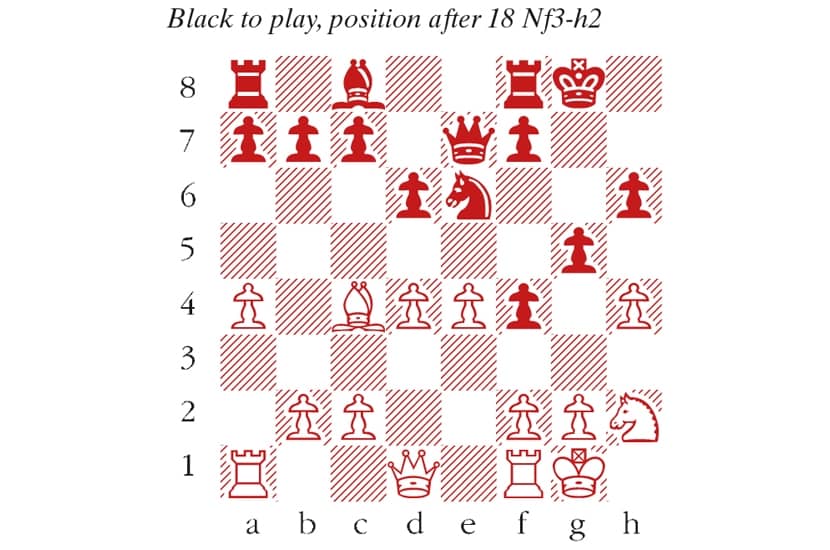Since tennis matches are decided in sets, they are sometimes won by the player who has won fewer games. For example, with a 0-6, 6-4, 6-4 scoreline, 12 wins can beat 14. This statistical quirk goes by the name of Simpson’s paradox, and from a sporting point of view it is quite attractive. Even an abysmal start allows for a comeback.
I’m not aware of chess matches ever being scored in this way. But when the Champions Chess Tour kicked off in the early months of the pandemic, the scoring system of the knockout stages was an appealing adaptation of that idea. Knockout matches were, in effect, decided over two ‘sets’, with each set lasting for four rapid games, played over one day. The first set was allowed to be drawn, but if honours were even after two sets then the tiebreak kicked in.
For the most part, this made for exciting matches and minimised ‘dead’ games. It was clear from the start that forging a marketable broadcast event was a priority. The scoring system was not the only consideration; the endorsement of Magnus Carlsen, the accessible commentary, and the pandemic-inspired chess boom all played a part. It seems that sponsors liked what they saw. At the start of 2021, the media monitoring company Meltwater became the tour’s title partner. Last month Mastercard announced its own partnership with the tour, citing 27 million hours of chess being watched during the season and naming Carlsen as a global brand ambassador.
The second season has just concluded with the $300,000 Meltwater Champions Chess Tour Finals. Holding it in San Francisco, as slated, proved to be infeasible, so it was held online like the rest of the series, with three out of ten players (Magnus Carlsen, Anish Giri and Jan-Krzysztof Duda) convening in Oslo.
Alas, the finals had a hint of anticlimax which was baked into the format — an unforced error that could be avoided in future editions. Instead of a knockout, the event was played as an all-play-all, with each player given bonus points according to their performance throughout the season. That conferred a giant head start on Magnus Carlsen, and Wesley So was the only player with a realistic chance of catching him. Carlsen’s victory was assured a couple of days before the finish, even though it was Teimour Radjabov who performed best in the final stage.
Wesley So–Teimour Radjabov
Meltwater Champions Final, October 2021
1 e4 e5 2 Nf3 Nc6 3 Bc4 Bc5 4 O-O Nf6 5 d3 O-O 6 Bg5 h6 7 Bh4 Be7 It’s worth redeploying this bishop to break the pin on the h4-d8 diagonal. 8 Bg3 d6 9 a4 Nh7 10 Nc3 Ng5 11 Nd2 Ne6 12 Nd5 Bg5 13 Nf3 Ne7 14 h4 Bf4 15 Bxf4 exf4 16 Nxe7+ Qxe7 17 d4 At first sight, White enjoys a simple advantage, with good central control. Things are not that easy! Radjabov’s next move looks extravagant, but aims to show that h2-h4 is a significant weakening of the kingside. g5! 18 Nh2 (see diagram) 18 hxg5 hxg5 19 Re1 was playable, but one idea to reckon with is 19…Kg7, angling for Rf8-h8 and an attack down the h-file. 18…gxh4! It is ghastly to behold the kingside pawn structure which results from this move. But the zombie horde has strength in numbers. Besides snatching a pawn, Radjabov has a simple plan to smash the door down on the open g-file. 19 Re1 Kh8 20 e5 Qg5 21 Nf3 Qg4 22 exd6 22 Kh2 was essential, though after 22…Rg8 23 Bf1 Ng5 Black is still having more fun. 22…h3 23 Bf1 hxg2 24 Be2 Shielding behind the attacker’s pawn is often viable, but it falls short here. 24…Ng5! Now if 25 Nxg5 Qh4! threatens mate on h1, and then 26 Kxg2 Qxg5+ is devastating. 25 d5 Qh5 White resigns, in view of 26 Nh2 Nh3+ 27 Kxg2 Rg8+.






Comments